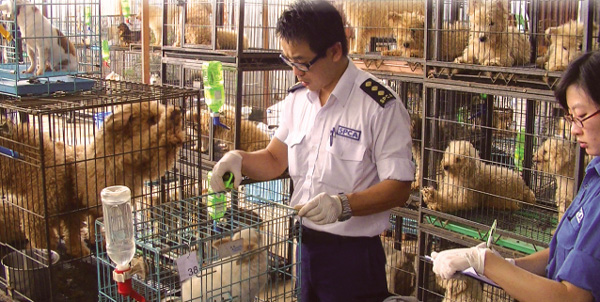Stuck in the dog house
 0 Comment(s)
0 Comment(s) Print
Print E-mail China Daily, December 2, 2013
E-mail China Daily, December 2, 2013
Plans to clamp down on unlicensed dog breeding in the city has caused a rift between animal groups which threatens to stall the proposals from becoming law, writes Hazel Knowles.
|
|
|
SPCA officers administer help to some of the 149 dogs found caged at a suspected animal breeding farm in Lau Fau Shan. The charity claims the cost of caring for sickly animals rescued from breeders is millions of dollars. |
The little dachshund was a pitiful sight. It was skin and bone, completely without fur and covered in sores.
The dog was one of 101 discovered by police in cages piled on top of each other and surrounded by rubbish and animal waste in a 900-square-foot apartment in Tai Kok Tsui earlier this month.
According to Sandy Macalister, the executive director of Hong Kong Society for the Prevention of Cruelty to Animals, the case was one of the worst ever seen with many of the animals “in a horrendous state”.
Sadly, it is an all too common occurrence which highlights how Hong Kong is failing to protect dogs from unscrupulous breeders who put profit before animal welfare, says Macalister.
At the root of the problem is a loophole in the current animal traders’ regulations (Cap 139B of the Public Health Regulations), which allows people who claim to be private pet owners — also known as hobby breeders — to breed without a license. In doing, they escape the rules, restrictions and inspections which aim to protect the animals.
It is this loophole which has responsible for some of the city’s most alarming and cruel cases of dog breeding.
Last year, the Agriculture, Fisheries and Conservation Department (AFCD) responded to calls to get tough on dog breeders. The department announced proposals to amend Cap 139b which would require anyone involved in breeding dogs to have a license.
According to Macalister, it was a move the AFCD expected the animal NGOs to embrace. The public consultation that followed, however, revealed a deep split in the animal loving community — one which now threatens to stall the progress of the amendment and leave the unlicensed breeder operating unchecked.
On one side are the groups like the SPCA, which admit the changes are not perfect but that they represent a significant step in improving the lives of the dogs being bred commercially.
On the other side are those saying the amendments do not go far enough, will be difficult to enforce, will encourage more small scale breeders and will not provide adequate protection for the animals.
At present there are only around 10 licensed commercial breeders in the city. A survey of 155 pet traders by the AFCD between February 2010 and July 2011 found that of the 11,542 dogs sold, 22 per cent were imported and 4 per cent came from licensed local breeders. But the majority — a massive 74 per cent — came from hobby breeders.
|
|
|
In September 2010, 149 dogs were rescued from a suspected unlicensed breeding farm in Lau Fau Shan. The owner was fined HK5,000 and sentenced to 150 hours of community service. |








Go to Forum >>0 Comment(s)